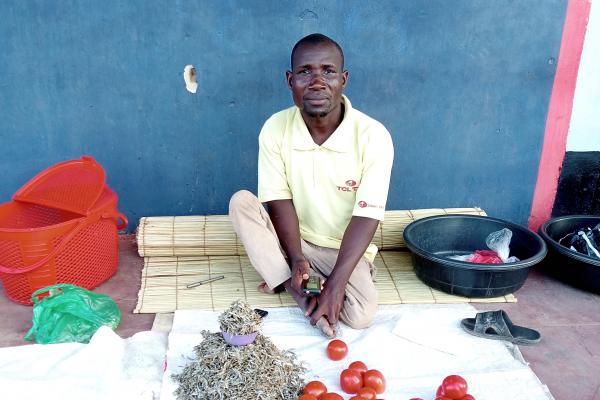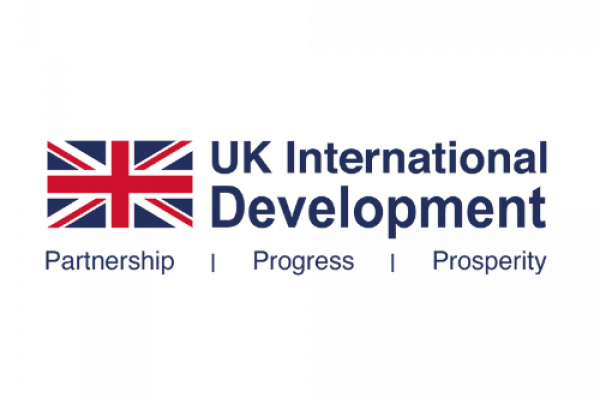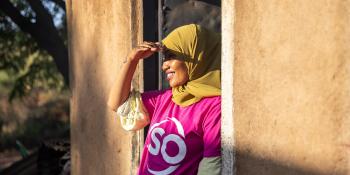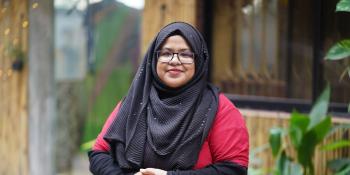Over a billion people in the world (or about 15% of the world’s population) are living with disabilities 1 most of them in developing countries. 2 They encounter various barriers such as lack of assistive devices and technology, inaccessible public spaces and transportation, discrimination, unemployment and lower labour market participation on a regular basis.
Persons with disabilities are the most marginalized despite being the ones that experience extreme poverty. They face different forms of discrimination and exclusion which vary according to the type of disability, culture and geography. Only one in three persons with disabilities are employed on average, meaning they are two times less likely to be employed than people without disabilities.3 Complicating their situation, climate change is also emerging as another driver of vulnerability characterized by extreme weather events and natural disasters that contribute to food insecurity, conflicts and psychological stress.
To respond to these challenges, VSO designs and implements inclusive programmes that empower young people with disabilities and help them access green jobs and decent work opportunities. These include work-based training programmes (internships and apprenticeships), technical and vocational trainings, employment opportunities, financial inclusion, social protection and behavior change interventions addressing discriminatory attitudes and practices among others. Climate resilience interventions adapted to the needs of people with disabilities coupled with human rights awareness and improved access to basic services and responsive policy environment have greater potential in improving their quality of life.
As we celebrate the UN’s International Day of Persons With Disabilities on December 3, we look back at three of the numerous inspiring stories of hope that demonstrate how VSO’s resilient livelihoods programming is changing the lives of persons with disabilities for the better with a focus on young women and men.
Sewing her dream as enterpreuneur: the story of Bimala
Bimala Kumari Buda is a 19 year old girl with physical disability. She lives with her parents in Janmatole-Baijanath, Banke in Nepal. Despite her ability to focus on education, household duties, poverty and difficulties associated with her impairment compelled Bimala to drop out of school at the age of 16. But her life turned around when she participated in a training conducted by VSO.
VSO implements ENGAGE (Empowering a New Generation of Adolescent Girls with Education) in Nepal to help out-of-school girls and children with disabilities to transition to formal schools through basic literacy and numeracy, and develop their entrepreneural skills.
Bimala decided to get trained in tailoring with the intention of opening a small business in the local market. The project provided Bimala with 3 months doll/cushion making training which she successfully completed. Prior to enrolling in the cushions and doll making training, she had been learning how to sew and make clothes, but could not continue due to financial constraints.
Through ENGAGE, Bimala learned sewing skills which allowed her to come up with creative designs and was able to create cushions and dolls much more quickly than she initially anticipated. She was able to start selling her designs to local women and vendors, trained two other girls in the community, and now plans to expand her business.
Grateful of the opportunity, Bimala acknowledged, “Through this training, I have not only acquired skills and polished my performance, but also enhanced my financial standing. It boosted my self-confidence and made me independent. I hope VSO can reach out to many more young women with disabilities who have so much talent but need support to express it and change their lives as they have done to me.”
Cultivating his business acumen: the story of Kalimina

Nkonge Kalimina, is a 30-year-old man with a physical disability (his lower limbs are paralysed) and lives in Messengers Compound of Chief Kasoma Bangweulu in Samfya district in Zambia. He only attained primary level of education due to illness and poverty. Kalimina is the first-born and only son in a family of five. They are a peasant family who grow crops for subsistence.
He received information about the VSO employability and entrepreneurship skills development opportunity under the Enhancing Youth Entrepreneurship and Employability (EYEE) Project implemented in Samfya district in partnership with the Samfya Association of Persons with Disabilities (SAPD). He got interested in the training because of his passion about starting and managing a business. Kalimina was among the 152 young people in Samfya who were selected and trained on entrepreneurship skills under EYEE.
Since then he has started a small business of selling dry Kapenta (small fish), tomatoes, onion, and vegetables at Lupili Market. From the small amount of 200 Kwacha for selling tomatoes, his income kept growing because of his newly gained knowledge on managing a small enterprise. He is now a member of 5 youth clubs formed under the project and is also actively participating in one of the savings and lending groups as a way of promoting financial inclusion.
With the success that he is reaping, Kalimina is grateful to VSO, “Thank you VSO for the knowledge acquired and support given, I will always apply this knowledge in my business which I hope to expand to help my family.”
Envisioning her bright future: the story of Hope
Hope Mubanga, is a 26-year-old woman who lives in John Leigh, Lusaka, Zambia. She lost her eyesight in 2012 . Because of it, her parents had to send her to a special school in Ndola where she completed her secondary school with good marks. However due to economic difficulty, Hope could not further her studies and go to college. resources were scarce as there were 13 mouths to feed with her father being the only breadwinner.
Seeing the financial strain in the family, Hope decided to start a small business to help supplement the income at home. In January 2022, she established a fritter making business. Her starting capital was 100 Kwacha which she had managed to save. She bought her ingredients which included 2kg flour, 1 litre cooking oil, a small sachet of sugar and started making fritters. She would make a bucket of fritters per day and sell them from home.
In March 2022, Hope attended the entrepreneurship trainings in Kanyama under the VSOs’ EYEE project. From the training, Hope learnt about managing a small business and her key take away lesson was savings which she has applied diligently in managing her finances. After the training, she started saving a minimum of 20 Kwacha per day until she could raise enough to scale up her business capital. She now manages to buy ingredients in much more larger quantities: 10kg packet of flour, 2,5litres of cooking oil and a 2 kg packet of sugar.
The scaling up of her production meant penetrating other markets beyond her community which would tricker a turnover on her investment. She considered the Lusaka Central Business District (CBD); her challenge was that she was not able to go alone due to her disability. However, she did not allow her disability to stand in her way. Hope engaged someone to sell for her in the CBD at a minimum wage per day. She increased her stock from selling 1 bucket a day to 3 buckets a day.
Hope is slowly realising her goal of saving for college fees next year. She envisions to study Clinical and Psychosocial Counselling at the University of Zambia. She indicated however that part of her profits goes towards assisting her siblings with school requirements. “I started my business in January 2022 with just 100 Kwacha and over the last few months I have managed to scale it up to being worthy 500 Kwacha in profit per day.
My aim is to be saving 200 Kwacha per week until December because I want to go to university next year. I also want to help my young siblings with school requirements to lessen the burden on my father who is taking care of everyone at home. I would like to thank VSO for the opportunity to learn and acquire entrepreneurship skills. My vision in 2023 is to open a small restaurant where I will be continuing with my business.”
Hope wants to prove to society that disability is not a limitation to anyone. “There is Hope in challenges we face in life and VSO has given me that hope that everything will be okay, despite having lost my sight at the age of 16, I still have a bright future, thanks to the knowledge shared that came at the right time.”
In solidarity with all the persons with disabilities across the globe, we celebrate this International Day of Persons with Disabilities with these stories that prove that barriers hindering people with disabilities can be overcome with the right inclusive programming approach. VSO designed and implemented interventions that strengthened their economic participation including development and implementation of inclusive policies, practices and services. We will continue to develop and nurture partnerships in the areas of decent work, employment, food security and agriculture and take a collective approach towards building the capabilities of persons with disabilities.

Footnotes
- International Labour Organisation (2022). New ILO database highlights labor market challenges of persons with disabilities. https://ilostat.ilo.org/new-ilo-database-highlights-labour-market-challenges-of-persons-with-disabilities
- World Bank Group. (2018). Disability inclusion and accountability framework. http://documents.worldbank.org/curated/en/437451528442789278/Disability-inclusion-and-accountability-framework
Read more
Protecting the biodiversity of the East Tonlé Sap Lake through aquaculture
Aquaculture — the farming of aquatic organisms, such as eels, shellfish, and seaweed, in a controlled environment — is transforming the lives of people like Mr Em Phat, who are living on the East Tonlé Sap Lake in Cambodia.

Five things women achieved this year that you might not know about
This International Women's Day, join us in celebrating the resilience of women across the globe with some female achievements you might not have heard about.

Breaking barriers: Lamia's journey of volunteering, leadership, and gender equity
Bangladesh - Lamia Tasnim's volunteering journey began in 2018, and over the course of the last six years, her passion for supporting her community has only grown.
